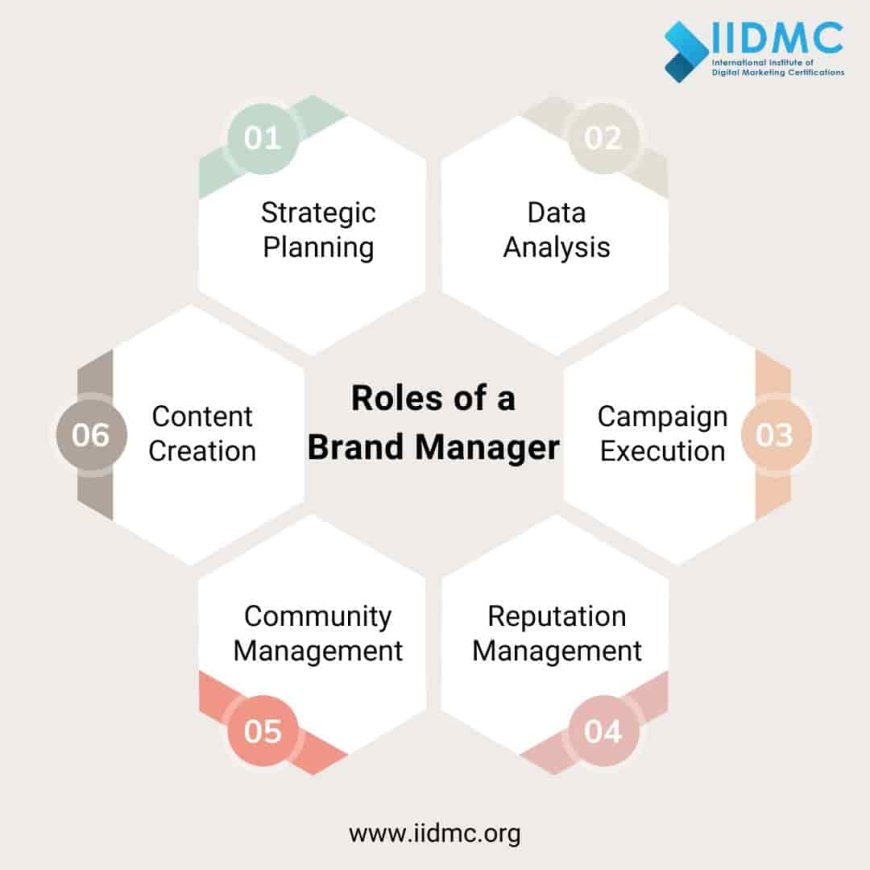What are the Roles of a Brand Manager
Learn about the key responsibilities of a brand manager, including crafting marketing strategies, developing brands, and engaging with consumers effectively

A brand manager is the person in charge of shaping a brand's image and ensuring it stays on track in the market. They research, plan, and collaborate to keep the brand successful and relevant. A brand manager shapes a brand's image, plans marketing campaigns, and works with teams to keep the brand successful and relevant in the market. Brand managers have become increasingly important in companies because they shape how people see and interact with brands. They create strategies to connect with customers, run effective marketing campaigns, and maintain brand consistency. In a competitive market, their role in building and protecting brand reputation directly affects a company's success.
The roles of a Brand Manager encompass strategic brand development, campaign management, market research, partnership coordination, and crisis handling, ensuring consistent brand identity and maximizing marketing effectiveness.
Key Roles of Brand Management
-
Strategic Planning: Brand managers develop and implement strategies to position the brand effectively and differentiate it from competitors.
-
Brand Identity Development: They create and maintain a consistent visual and verbal identity that reflects the brand's values and resonates with the target audience.
-
Market Research and Analysis: Conducting research helps them understand consumer preferences, market trends, and competitive landscapes to inform brand strategies.
-
Brand Communication: They develop and execute communication strategies across various channels to build brand awareness, engage customers, and foster brand loyalty.
-
Brand Monitoring and Measurement: Brand managers monitor brand performance, track key metrics, and analyze feedback to assess the effectiveness of branding efforts.
-
Brand Experience Management: Ensuring every interaction with the brand delivers a consistent and positive experience, from product design to customer service.
-
Brand Innovation and Adaptation: Identifying opportunities for brand extension, innovation, and adaptation to meet consumer needs and stay relevant in the marketplace.
Challenges Faced by Brand Managers
Consistency Across Channels: Brand managers grapple with maintaining a consistent brand message and image across various channels and touchpoints. To overcome this challenge, utilize brand guidelines and monitoring tools to ensure uniformity in communication. Regularly audit brand assets and messaging to identify and address inconsistencies.
Adapting to Market Shifts: Rapid changes in consumer behaviour, technology, and market trends pose a constant challenge for brand managers. Stay agile by conducting thorough market research, monitoring industry trends, and gathering feedback from consumers. Use this insight to adjust strategies and offerings to meet market demands effectively.
Standing Out in a Crowded Market: Competition is fierce, making it difficult for brands to differentiate themselves. To stand out, focus on your unique value proposition and communicate it clearly to your target audience. Invest in creative marketing campaigns, product innovation, and exceptional customer experiences to capture attention and loyalty.
Building Strong Brand Equity: Establishing and maintaining brand equity requires ongoing effort and investment. Foster brand loyalty by consistently delivering on brand promises and exceeding customer expectations. Invest in brand-building activities such as storytelling, community building, and strategic partnerships to enhance brand perception and loyalty.
Managing Brand Reputation: Negative publicity or customer feedback can damage a brand's reputation. Monitor brand mentions and sentiment across social media and other channels, and respond promptly and transparently to any issues. Proactively engage with customers to address concerns and showcase your brand's commitment to customer satisfaction.
Optimizing Resource Allocation: Limited budgets, manpower, and time can hinder brand management efforts. Prioritize initiatives that offer the highest ROI and leverage cost-effective marketing tactics such as content marketing, social media, and influencer partnerships. Utilize data and analytics to track performance and allocate resources effectively.
Measuring Brand Impact: Quantifying the impact of branding activities and demonstrating ROI can be challenging. Establish clear KPIs aligned with business objectives, such as brand awareness, engagement, and customer retention. Use analytics tools to track performance metrics and gather insights into the effectiveness of branding efforts. Regularly review and adjust strategies based on performance data to optimize brand impact over time.
What are the roles of a Brand Manager?

Strategic Planning: Brand managers develop digital marketing strategies that leverage social media platforms to enhance brand visibility, engagement, and conversion rates.
Content Creation and Curation: They oversee the creation and curation of compelling content tailored to various social media channels, ensuring alignment with the brand's voice, values, and objectives.
Community Management: Brand managers actively engage with the brand's social media audience, responding to comments, inquiries, and feedback to foster meaningful connections and brand loyalty.
Data Analysis and Optimization: They analyze digital marketing metrics and social media analytics to assess campaign performance, identify trends, and optimize strategies for improved reach and ROI.
Campaign Execution: Brand managers coordinate the execution of digital marketing campaigns across social media platforms, collaborating with internal teams and external partners to ensure seamless implementation and alignment with brand guidelines.
Reputation Management: In the field of digital marketing and social media, brand managers monitor online conversations, address customer concerns promptly, and manage crises effectively to safeguard the brand's reputation and credibility.
The role of a Brand Manager is multifaceted and crucial in shaping a brand's identity, fostering customer engagement, and driving business success. From strategic planning to campaign execution, brand managers play a pivotal role in navigating the dynamic landscape of digital marketing and social media. By effectively managing brand reputation, optimizing resource allocation, and leveraging data-driven insights, they ensure that brands remain relevant, competitive, and resonant with their target audience. In an ever-evolving marketplace, the expertise and dedication of brand managers are indispensable for building and sustaining strong brand equity and fostering meaningful connections with customers.





























